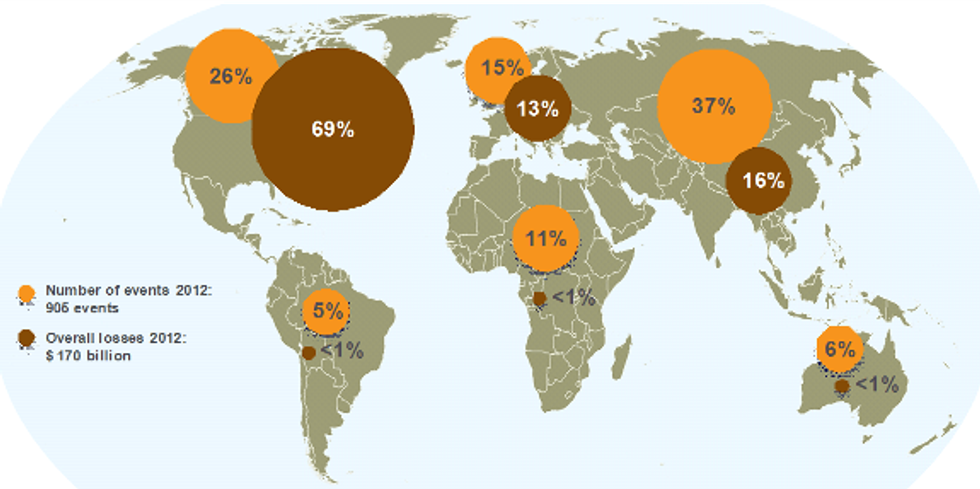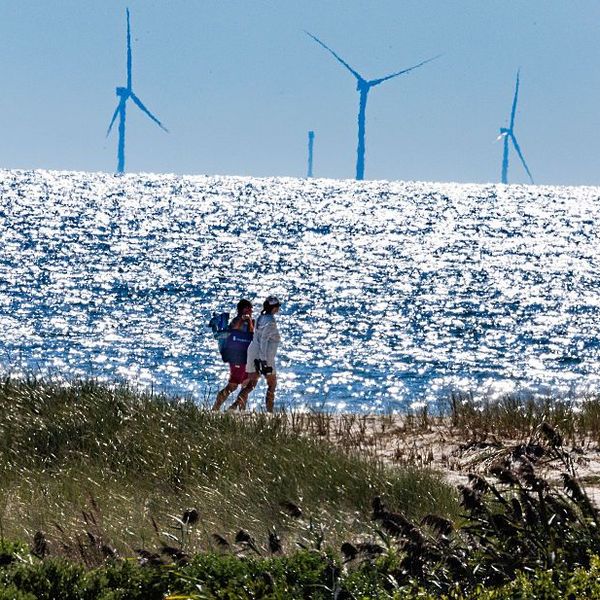US Loses Billions to 'Weather Whiplash'
Following extreme storms and drought, the US alone accounted for nearly 70 percent of global losses in 2012

According to a new report--Natural Catastrophes in 2012 Dominated by U.S. Weather Extremes--published Wednesday by the environmental research organization World Watch Institute, of the enormous global cost of $170 billion due to natural catastrophes last year, the United States alone accounted for 69 percent of overall losses.
Focusing specifically on the "insured losses" as a result of these events, the report found that at 92 percent, the United States accounted for nearly all of the $70 billion global hit.
The pattern of crazy weather extremes--referred to as "weather whiplash"--has dominated US forecasts in recent years and caused the country to pay a high toll.
The report notes specifically that,
with regard to insured losses, a particularly striking feature in the climatological events category was that droughts accounted for 28 percent. This is well above the long-term average of 7 percent and was due to the severe drought that primarily afflicted the US Midwest during the year, causing immense agricultural losses.
The extreme drought that plagued much of the US throughout 2012, and which has continued into this year, was alone responsible for overall losses of $20 billion.
Globally, 93 percent of the 905 natural catastrophes in 2012 were weather-related disasters and, according to the report, their devastation is growing. "Since 1980, geophysical events have been more or less stable," they write, "whereas weather-related events have increased 2.8- to 3.6-fold."
Further, of the overall global losses due to natural catastrophes, in 2012 nearly 60 percent were attributable to increasingly severe storms, such as Sandy, compared with the long-term average of 39 percent.
_____________________
An Urgent Message From Our Co-Founder
Dear Common Dreams reader, The U.S. is on a fast track to authoritarianism like nothing I've ever seen. Meanwhile, corporate news outlets are utterly capitulating to Trump, twisting their coverage to avoid drawing his ire while lining up to stuff cash in his pockets. That's why I believe that Common Dreams is doing the best and most consequential reporting that we've ever done. Our small but mighty team is a progressive reporting powerhouse, covering the news every day that the corporate media never will. Our mission has always been simple: To inform. To inspire. And to ignite change for the common good. Now here's the key piece that I want all our readers to understand: None of this would be possible without your financial support. That's not just some fundraising cliche. It's the absolute and literal truth. We don't accept corporate advertising and never will. We don't have a paywall because we don't think people should be blocked from critical news based on their ability to pay. Everything we do is funded by the donations of readers like you. Will you donate now to help power the nonprofit, independent reporting of Common Dreams? Thank you for being a vital member of our community. Together, we can keep independent journalism alive when it’s needed most. - Craig Brown, Co-founder |

According to a new report--Natural Catastrophes in 2012 Dominated by U.S. Weather Extremes--published Wednesday by the environmental research organization World Watch Institute, of the enormous global cost of $170 billion due to natural catastrophes last year, the United States alone accounted for 69 percent of overall losses.
Focusing specifically on the "insured losses" as a result of these events, the report found that at 92 percent, the United States accounted for nearly all of the $70 billion global hit.
The pattern of crazy weather extremes--referred to as "weather whiplash"--has dominated US forecasts in recent years and caused the country to pay a high toll.
The report notes specifically that,
with regard to insured losses, a particularly striking feature in the climatological events category was that droughts accounted for 28 percent. This is well above the long-term average of 7 percent and was due to the severe drought that primarily afflicted the US Midwest during the year, causing immense agricultural losses.
The extreme drought that plagued much of the US throughout 2012, and which has continued into this year, was alone responsible for overall losses of $20 billion.
Globally, 93 percent of the 905 natural catastrophes in 2012 were weather-related disasters and, according to the report, their devastation is growing. "Since 1980, geophysical events have been more or less stable," they write, "whereas weather-related events have increased 2.8- to 3.6-fold."
Further, of the overall global losses due to natural catastrophes, in 2012 nearly 60 percent were attributable to increasingly severe storms, such as Sandy, compared with the long-term average of 39 percent.
_____________________

According to a new report--Natural Catastrophes in 2012 Dominated by U.S. Weather Extremes--published Wednesday by the environmental research organization World Watch Institute, of the enormous global cost of $170 billion due to natural catastrophes last year, the United States alone accounted for 69 percent of overall losses.
Focusing specifically on the "insured losses" as a result of these events, the report found that at 92 percent, the United States accounted for nearly all of the $70 billion global hit.
The pattern of crazy weather extremes--referred to as "weather whiplash"--has dominated US forecasts in recent years and caused the country to pay a high toll.
The report notes specifically that,
with regard to insured losses, a particularly striking feature in the climatological events category was that droughts accounted for 28 percent. This is well above the long-term average of 7 percent and was due to the severe drought that primarily afflicted the US Midwest during the year, causing immense agricultural losses.
The extreme drought that plagued much of the US throughout 2012, and which has continued into this year, was alone responsible for overall losses of $20 billion.
Globally, 93 percent of the 905 natural catastrophes in 2012 were weather-related disasters and, according to the report, their devastation is growing. "Since 1980, geophysical events have been more or less stable," they write, "whereas weather-related events have increased 2.8- to 3.6-fold."
Further, of the overall global losses due to natural catastrophes, in 2012 nearly 60 percent were attributable to increasingly severe storms, such as Sandy, compared with the long-term average of 39 percent.
_____________________

